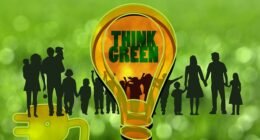China’s tit-for-tat import taxes on some American goods came into effect on Monday, as the trade war between the world’s two biggest economies escalates and US President Donald Trump threatens to hit more countries with tariffs.
Beijing announced the plan on 4 February, minutes after new US levies of 10% on all Chinese products came into effect.
On Sunday, Trump said he would impose a 25% tariff on all steel and aluminium imports into the US, with a full announcement to come on Monday.
Speaking to reporters on Air Force One en route to the Super Bowl, he also said he was planning reciprocal tariffs on other nations – but did not specify which ones would be targeted.
China’s latest tariffs on US goods include a 15% border tax on imports of US coal and liquefied natural gas products. There is also a 10% tariff on American crude oil, agricultural machinery and large-engine cars.
Last week, Chinese authorities launched an anti-monopoly probe into technology giant Google, while PVH, the US owner of designer brands Calvin Klein and Tommy Hilfiger, was added to Beijing’s so-called “unreliable entity” list.
China has also imposed export controls on 25 rare metals, some of which are key components for many electrical products and military equipment.
Trump’s announcement over the weekend of plans to impose a 25% tax on the US’s steel and aluminium imports comes days after he reached deals with Canada and Mexico to avoid 25% tariffs that he had threatened on all goods from the countries.
He introduced similar measures during his first term as president, imposing 25% tariffs on steel and 10% on aluminium, but later granted several trading partners duty-free quotas – including Canada, Mexico and Brazil.
The EU import taxes were not resolved until the Biden administration took over the White House.
There was no mention on Sunday of which countries, if any, would be granted similar exemptions if these new tariffs are implemented in the following days.
His intention to implement reciprocal tariffs would fulfil an election campaign pledge to levy tariffs at the same rates that are imposed on US goods.
He also said import taxes for vehicles remained on the table after reports he was considering exemptions to universal tariffs.
Trump has repeatedly complained that European Union (EU) tariffs on imports of American cars are much higher than US levies.
The day after the latest US tariffs came into effect, Beijing accused Washington of making “unfounded and false allegations” about its role in the trade of the synthetic opioid fentanyl to justify the move.
In a complaint lodged with the World Trade Organization (WTO), China said the US import taxes were “discriminatory and protectionist” and violated trade rules.
But experts have warned China is unlikely to secure a ruling in its favour as the WTO panel that settles disputes remains unable to function.
Trump had been expected to speak to his Chinese counterpart Xi Jinping in recent days but the US president has said he was in no hurry to hold talks.
Some of the many measures brought in by Trump since he took office on 20 January have been subject to change.
On Friday, he suspended tariffs on small packages from China, which, along with the additional 10% tariffs, came into effect on 4 February.
The suspension will stay in place until “adequate systems are in place to fully and expediently process and collect tariff revenue”.
After the order ended duty-free treatment of shipments worth less than $800 (£645) the US Postal Service (USPS) and other agencies scrambled to comply.
USPS temporarily stopped accepting packages from China, only to U-turn a day later.













